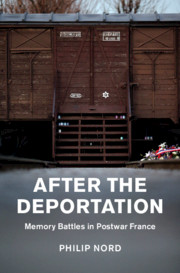Book contents
- After the Deportation
- Studies in the Social and Cultural History of Modern Warfare
- After the Deportation
- Copyright page
- Dedication
- Contents
- Figures
- Acknowledgments
- Abbreviations
- Introduction
- Part I Heroes and Martyrs
- Part II Shoah
- 7 Holocaust
- 8 The Teaching of Contempt
- 9 Witnesses
- 10 Generation
- 11 “The Return of the Repressed”
- 12 Shoah
- Epilogue and Conclusion
- Notes
- Index
7 - Holocaust
from Part II - Shoah
Published online by Cambridge University Press: 16 November 2020
- After the Deportation
- Studies in the Social and Cultural History of Modern Warfare
- After the Deportation
- Copyright page
- Dedication
- Contents
- Figures
- Acknowledgments
- Abbreviations
- Introduction
- Part I Heroes and Martyrs
- Part II Shoah
- 7 Holocaust
- 8 The Teaching of Contempt
- 9 Witnesses
- 10 Generation
- 11 “The Return of the Repressed”
- 12 Shoah
- Epilogue and Conclusion
- Notes
- Index
Summary
Even as the Gaullist narrative of the Resistance and Deportation asserted its primacy, the Jewish story continued to percolate, drawing growing public attention to itself. That was in part thanks to the intercession of sympathetic Catholics, a number that included, not just Father Riquet, but also François Mauriac and Paul Flamand. Both were practicing Catholics, the former a Nobel prize-winning novelist, the latter a founding editor of Le Seuil, one of France’s leading publishing houses. Mauriac enabled Elie Wiesel to get into print and in fact wrote the preface to Wiesel’s La Nuit when it first appeared in 1958. The latter was patron to André Schwarz-Bart, author of Le Dernier des Justes (1959), the first Holocaust-themed best-seller in France. He also helped launch the career of Saul Friedländer, then a student of the Vatican’s wartime diplomacy but soon to become one of the world’s leading Holocaust historians.
Keywords
Information
- Type
- Chapter
- Information
- After the DeportationMemory Battles in Postwar France, pp. 229 - 263Publisher: Cambridge University PressPrint publication year: 2020
